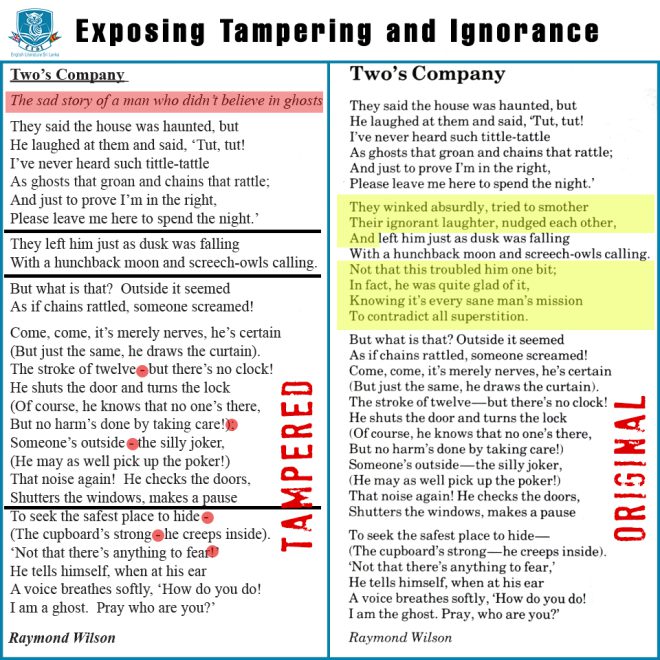Exposing Tampering and Ignorance - The Distorted Poem in "Appreciation of English Literary Texts"
Copyright © 2023 ELSL. All rights reserved
Duplication, distribution and/or adaption of any part of the work without the written permission of ELSL is a punishable offence under the Intellectual Property Act, No. 36 of 2003. (Sri Lanka)
Distortions and Mistakes
The tampered version of “Two’s Company,” contained in “Appreciation of English Literary Texts,” has several noticeable errors that have altered the original work’s essence and integrity. One of the most blatant inconsistencies is the addition of a subtitle that does not exist in the authentic version. This unauthorised alteration not only misrepresents the poet’s intention but also disrupts the overall thematic coherence of the poem.
Moreover, the stanza form of the poem has been distorted, resulting in a disordered presentation that deviates significantly from the original structure. This careless oversight not only disrupts the poem’s aesthetic appeal but also jeopardises the reader’s understanding of its intended rhythm and flow.
Shockingly, six lines of the original poem have been inexplicably removed, depriving readers of crucial elements that contribute to the poem’s meaning and depth. Such an act of omission reflects a disregard for the poet’s work and a lack of appreciation for the intricacies of literary composition.
Furthermore, the tampered version is riddled with a blatant misuse of punctuation. The original em dashes, which serve a distinct purpose in the poem, have been erroneously transformed into hyphens, leading to a loss of their intended effect. This conversion is not only a sign of negligence but also exhibits a lack of understanding of the poem’s linguistic nuances.

The Ignorance of a Government Organisation
The gravity of these errors becomes even more disconcerting when we consider that they were committed by a government organization, the National Institute of Education. As a responsible body entrusted with the task of shaping the minds of the nation’s youth, it is imperative that the utmost care and attention be given to educational materials.
The fact that such glaring mistakes were made, altering the original poem and disregarding the poet’s creative work, raises serious questions about the competence and professionalism of the National Institute of Education. How can we expect our students to develop a genuine appreciation for English literary texts when the very materials provided to them are marred by such blatant errors?
Education plays a pivotal role in shaping the future generations of our country. It is through literature and poetry that students can explore the depths of human emotions, expand their horizons, and develop critical thinking skills. However, when a respected institution fails to uphold the integrity of the texts it presents, it undermines the very foundation of education.
The tampering of “Two’s Company” not only undermines the work of the poet, Raymond Wilson, but also compromises the trust that students and teachers place in the educational system. By removing lines, distorting the stanza form, and altering punctuation, the true essence and beauty of the poem are lost, robbing students of a meaningful and enriching experience.
It is essential to hold the responsible parties accountable for this grievous error. The Educational Publications Department, as the publisher, and Vishva Graphics, as the printer, must take responsibility for their roles in disseminating a tampered version of the poem. They have a duty to ensure the accuracy and authenticity of the educational materials they produce. Such negligence not only reflects poorly on their professionalism but also undermines the credibility of the entire education system.
In light of this incident, it is imperative that the National Institute of Education conducts a thorough investigation into its processes and quality control mechanisms. This incident should serve as a wake-up call to implement stricter standards and protocols to prevent the recurrence of such mistakes. Additionally, it is crucial that the Institute takes immediate action to rectify this error by issuing an official statement acknowledging the tampering and providing corrected versions of the poem to all affected students and educational institutions.
The role of the National Institute of Education extends beyond administrative tasks; it has a duty to promote and nurture a love for literature and education. This incident not only highlights the need for greater accountability within the education system but also emphasises the importance of respecting and preserving the artistic integrity of literary works.
In conclusion, the tampering of Raymond Wilson’s poem, “Two’s Company,” in the book “Appreciation of English Literary Texts,” is a grave breach of trust and professionalism. The errors and distortions in this tampered version not only misrepresent the poet’s intent but also diminish the educational experience for students. It is imperative that the responsible bodies, including the National Institute of Education, the Educational Publications Department, and Vishva Graphics, rectify this situation promptly and take steps to prevent such negligence in the future. Only through a commitment to accuracy, integrity, and a genuine appreciation for literature can our education system truly empower and inspire the minds of our youth.
